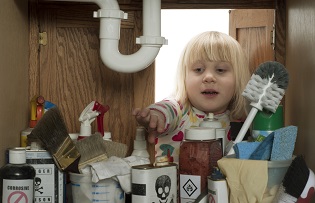 Most of us live with dangerous poisons lurking in kitchen cabinets, bathrooms, basements or garages. When warning labels are ignored or chemicals fall into the wrong hands, disaster can occur.
Most of us live with dangerous poisons lurking in kitchen cabinets, bathrooms, basements or garages. When warning labels are ignored or chemicals fall into the wrong hands, disaster can occur.
More than 300 children are treated in the U.S. every day and two die as a result of poisoning, according to the Centers for Disease Control and Prevention. This is largely from ingesting personal care products, like cosmetics or household cleaning supplies.
Make informed decisions about the type of products you bring into your home. Before you buy, read the label to make sure you know exactly what you're purchasing. Also, understand terms and definitions found on product labels:
- "Caution" indicates the lowest level of potential harm
- "Warning" indicates a higher level of potential harm, meaning someone could be seriously ill or injured
- "Danger" indicates the highest level of potential harm: tissue damage to skin, blindness, death or damage to the mouth, throat or stomach if swallowed
Living with chemicals is a reality. Understanding risk and limiting exposure are paramount to keeping your family safe.
Detergent Pods Pose Significant Risk to Children
Detergent pods for laundry and dishwashers are attractive to infants and toddlers because they are soft and colorful and resemble candy, toys and teething products, but they are also a threat to children’s safety. The American Association of Poison Control Centers reports children under the age of 5 ingested, inhaled or were exposed through skin or eye contact to single-load laundry pods over 9,000 times in 2018.
Detergent pods can cause serious problems for children who bite into them. Many incidents require hospital treatment, sometimes in intensive care units. Effects include severe vomiting, severe breathing trouble, burns to the esophagus and coma. The liquid from detergent pods also can cause burns to the eye and skin.
Keep Button Batteries Away From Children
Coin lithium batteries, or button batteries, are little silver-colored discs that power everything from toys and electronics to watches and musical greeting cards. If swallowed or placed in the nose or ears, button batteries can cause serious injury or death.
More than 3,500 people of all ages swallow button batteries every year in the U.S. Most pass through the body and are eliminated, but sometimes they get caught in the esophagus. An electrical current can form in the body, and hydroxide, an alkaline chemical, can cause tissue burns that can be fatal.
What Can You Do to Reduce Risk?
The CDC recommends keeping toxic products in their original packaging, and storing them out of sight and out of reach of curious children.
Additionally, the Health Resources & Services Administration recommends:
- Keep all chemicals, household cleaners, medicines and potentially poisonous substances in locked cabinets or out of the reach of children
- Keep children where you can see them at all times, even when you go to answer the door or telephone
- Never leave young children alone
- Do not leave poisons on a counter or in an unlocked cabinet
- Never carry something that can be poisonous, such as a medicine, in a purse where children may find it
- Safety latches on drawers or cabinets, and child resistant caps on bottles are helpful in keeping poisons out of the hands of children
Be Prepared
Keep the National Poison Control Center number, (800) 222-1222, in your cell phone contacts. The line is open 24 hours a day, 7 days a week.

 Most of us live with dangerous poisons lurking in kitchen cabinets, bathrooms, basements or garages. When warning labels are ignored or chemicals fall into the wrong hands, disaster can occur.
Most of us live with dangerous poisons lurking in kitchen cabinets, bathrooms, basements or garages. When warning labels are ignored or chemicals fall into the wrong hands, disaster can occur.